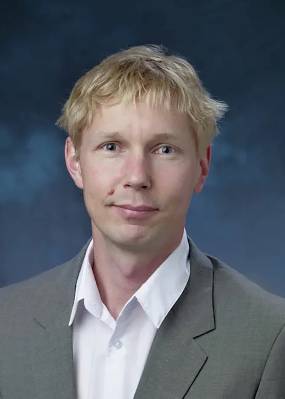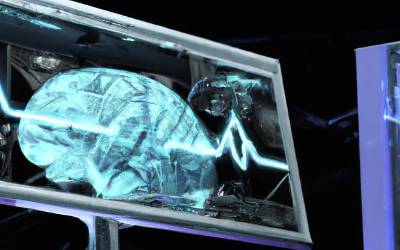Training the STEM leaders of tomorrow
With nearly $3 million in support from the National Science Foundation, Michigan State University is training today’s students to solve tomorrow’s STEM problems with the power of machine learning and artificial intelligence.

The project’s leader, Daniel Appelö, knows this probably won’t be the first time people have heard a researcher banging the drum about using computer tools to make pressing problems more tractable. But he also knows that machine learning has weathered its own hype and is already helping develop medicines, design high-performance materials and more.
That’s why MSU and the NSF are working to ensure the United States can maintain its leadership in the machine learning space — especially in science, technology, engineering and math applications — for generations to come.
“I’m old enough that I’ve seen lots of trends come and go in academia, but machine learning is different,” said Appelö, an associate professor in the Department of Mathematics in the College of Natural Science (NatSci) and the Department of Computational Mathematics, Science and Engineering, or CMSE, which is jointly administered by NatSci and the College of Engineering.
“Companies are making money from it. Countries are investing in it,” Appelö said. “This is where jobs are going to be generated in the future, and it’s important for us to stay competitive.”
MSU is one of 22 institutions across the United States to receive this type of award in 2022, which comes from the NSF Research Traineeship program.
“This NSF program supports graduate students, educates the STEM leaders of tomorrow and strengthens the national research infrastructure,” the agency said in a release earlier this year.
This year’s award had an explicit focus on artificial intelligence — which NSF called a national priority of utmost importance — and how it could help advance multiple STEM fields.
MSU’s co-investigators on the project are Yingda Cheng, a professor in mathematics and CMSE; Elizabeth Munch, an associate professor in mathematics and CMSE; Keith Promislow, professor of mathematics; and Brian O’Shea, a professor in CMSE and the Department of Physics and Astronomy, as well as the director of the Institute for Cyber-Enabled Research, or ICER.
“This has been a big collaborative effort with all the coinvestigators and personnel at my departments, colleges, the Office of the Provost,” Appelö said. “This environment is extremely supportive.”

: The new NSF grant will support roughly 50 graduate students at Michigan State University over five years. With additional support from the College of Engineering, the College of Natural Science and the Office of the Provost, the program is currently set up to train more than 80 graduate students over nine years in total. Credit: Department of Computational Mathematics, Science and Engineering
The NSF grant itself will support about 50 graduate students over five years. MSU will be able to nearly double that — training more than 80 students over nine years — thanks to contributions from the College of Natural Science, the College of Engineering and the Office of the Provost.
Bringing transparency to a black box
Machine learning is a type of artificial intelligence in which researchers train computers to analyze enormous data sets to find patterns and extract other helpful insights. A variety of industries and disciplines are already taking advantage of the speed and capabilities offered by machine learning algorithms, including finance, logistics and many STEM research fields.
The latter is where Appelö’s interests lie.
“My team and I try to create methods that make doing computer simulations faster, more accurate and more predictive,” said Appelö, whose research group is currently focused on things like plasmas, complex fluids and electromagnetic waves.
“Machine learning offers new opportunities to do this, but you have to be careful about enforcing the physics and constraints of reality,” he said. “You can’t treat it like a black box and trust it completely.”

Machine learning has the promise to accelerate research in STEM fields, but this will require people with unique training and expertise. MSU has won an NSF grant to help prepare that next-generation workforce. Credit: This image was created by the DALL·E 2 AI system.
Appelö and his colleagues saw an opportunity to get MSU’s students in on the ground floor of unpacking that black box with support from NSF. In the new program, the research and innovation that goes into harnessing the power of machine learning will become part of students’ existing doctoral training.
In particular, the program will focus on using machine learning to accelerate simulations spanning a broad range of size scales found in many STEM problems.
Think of drug design, wherein the shape and composition of a molecule can impact the health of an entire organism. Similar scale considerations are also present in engineering materials for better batteries, building reactors for fusion energy and furthering many more applications.
That’s in part why MSU is a natural fit for this traineeship program, Appelö said. The university attracts students with a diverse range of interests and it has the faculty to support them — a feature that originally drew Appelö to MSU and its CMSE department.
“Our approach is really in the spirit of CMSE. It’s a department that’s highly interdisciplinary and convergent,” Appelö said. “For the grant, we put together a team of co-investigators and senior personnel that cover a lot of different things in a program that has a unique structure to provide students with more interaction and engagement.”
To reach its technical goals, the new program will be integrated with existing STEM graduate programs to offer more instruction- and research-based opportunities emphasizing machine learning. MSU is also leveraging partnerships that will enable students to participate in internships in industry and national laboratories.
“This is an important component to keep things very real for our students,” Appelö said. “These places are in the business of solving real problems.”
The MSU team also wants to ensure its students are building the nontechnical skills they’ll need for success. To that end, the program also will include training and experience in outreach, entrepreneurship and communication.
“We want to make sure we’re really training tomorrow’s Ph.D. leaders in computational and STEM fields,” Appelö said. “There’s a need, and we’re excited to help enable a better education in this field.”
Banner image:Machine learning has the promise to accelerate research in STEM fields, but this will require people with unique training and expertise. MSU has won a nearly $3 million NSF grant to help prepare that next-generation workforce. Credit: This image was created by the DALL·E 2 AI system